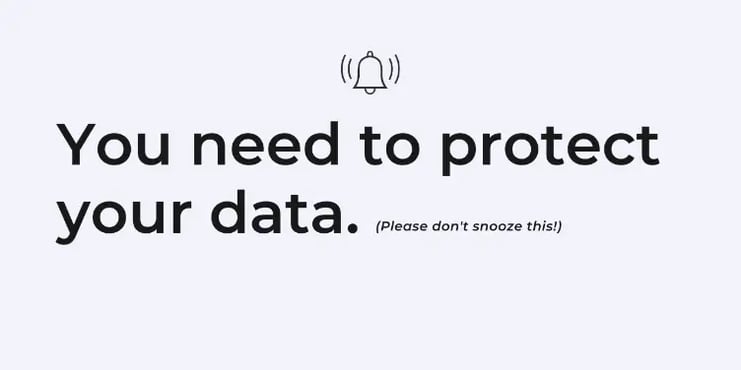Few words capture modern life quite like “snoozing”. We all know what it’s like to be rudely awakened by our alarm clock, only to tap that tempting snooze button for another few minutes of something resembling sleep.
If you dive into the subject a bit, you’ll find that snoozing effectively accomplishes two things:
- It slows down your productivity
- It’s bad for your health
While we’re no sleep experts, it’s easy to see the similarities between snoozing sleep and snoozing enterprise data protection. With that said, here’s your alarm clock:

When you snooze your alarm clock for another few minutes of sleep, you don’t really get any rest or do anything that will benefit you in the day to come. It’s the same with cybersecurity.
Truth is, no organization is 100% secure, but you, as a CEO, can control priorities and investments in security readiness. According to a survey from Gartner, 88% of Board of Directors view cybersecurity as a business risk, as opposed to a technology risk.
Do you know what to look for when choosing a secure email solution? Download our whitepaper “How to choose the right secure email solution?”
Reasons why snoozing is bad
1. Financial losses
The average cost of a data breach is $4.4 million. That’s money your HR department could’ve spent on the Christmas party of the century, or money you could’ve spent on growing your business. Either way, of all the possible expenses, a data breach is probably both among the most wasteful and the most preventable.
2. Fines
Of course, a data breach doesn’t just cost you money because you have to compensate your customers or employees, or because a hacker bought a yacht with your credit card details. Regulatory fines, like HIPAA, FISMA or GDPR fines, are equally impressive, and perhaps an even harder pill to swallow.
- HIPAA violation fines are based on the level of negligence and can range from $100 to $50,000 per violation (or per record), with a maximum penalty of $1.5 million per year. Violators may even face prison time ranging from 1-10 years.
- FISMA penalties include censure and loss of work for a number of agency employees.
- GDPR fines have two tiers of administrative fines: up to €10 million, or 2% annual global turnover – whichever is higher. Up to €20 million, or 4% annual global turnover – whichever is higher.
When paying a fine, an organization is forced to hold itself accountable for its lack of cybersecurity efforts. In that sense, having to pay a fine perfectly segues into what comes after:
3. Reputational losses
As a CEO, one of the worst press releases to sign off on are the ones that contain the words “data breach” and “sorry”. A data breach literally cuts a company's timeline in half. There will always be the time before a data breach and a time after. Even if your organization can weather the financial storm, every data breach leaves scars that will forever define its appearance.
This, in turn, leads to a fourth reason why not to postpone enterprise data protection, incidentally the same reason a lot of companies actually hit the snooze button in the first place.
4. Loss of productivity
Organizations often forego implementing solid cybersecurity solutions precisely because they don’t want operations to slow down. The irony is that compromised productivity is a common side effect of data breaches: resources that normally go toward daily operations must now be dispersed to mitigate the aforementioned side effects of a data breach - saving a reputation is a lot of work and most likely not your core business.
Now you got 4 solid reasons not to postpone secure communication for your organization. Let’s sum that up in a nice motivational poster:

You’d be forgiven for not getting out of bed for that one.
As you can see, it’s easy to point out the reasons for preventing data breaches, but as you probably know already, implementing any IT solution is often considered a complex undertaking. Not to mention that a lot of IT solutions are so complicated in and of themselves they do more harm than good.
The key is to find data protection that’s not only user-friendly, but also easy to install. In other words, it’s one thing not to snooze your cybersecurity efforts, it’s another thing to know how to go about it.
Fortunately, we can help you out with that last part:
Next time the issue of enterprise data protection comes up – if you’ve read this far that time is right now – don’t hit the snooze button. Hit the button below instead, and discover how to choose a suitable solution for your data protection, without slowing down productivity!

